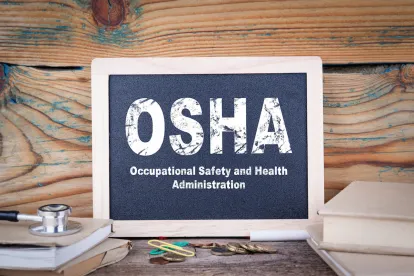On April 10, 2020, the US Department of Labor’s (“DOL”) Occupational Safety and Health Administration (“OSHA”) issued interim guidance on employers’ duties as they relate to recording cases of COVID-19. OSHA’s position—effective immediately and for the duration of the public health crisis—is that employers must report to OSHA any confirmed COVID-19 illness diagnosis (defined as “an individual with at least one respiratory specimen that tested positive for SARS-CoV-2”) that is both (i) work-related, and (ii) involves OSHA general recording criteria.
-
A condition is work-related if “an event or exposure in the work environment either caused or contributed to the resulting condition or significantly aggravated a pre-existing injury or illness.” The work environment is the employer’s “establishment” and such “other locations where one or more employees are working or are present as a condition of their employment.”
-
An injury or illness ordinarily involves OSHA general recording criteria if it results in death, days away from work, restricted work or transfer to another job, medical treatment beyond first aid, or loss of consciousness, or if it involves a significant injury or illness diagnosed by a physician or other licensed health care professional even if it does not result in death, missed work days, restricted work, job transfer, medical treatment beyond first aid, or loss of consciousness.
OSHA treats COVID-19 as a recordable illness if it meets the foregoing general principles; by contrast, colds and flus are not recordable illnesses. Despite expecting employers to treat COVID-19 as a recordable illness, OSHA recognizes that “employers . . . may have difficulty making determinations about whether workers who contracted COVID-19 did so due to exposure at work” in fields other than healthcare, emergency response, and correctional institutions because of the strong possibility of “community transmission.” Therefore, OSHA will “exercis[e] its enforcement direction in order to provide certainty to the regulated community.” In other words, OSHA will not enforce regulations requiring COVID-19 illness reporting in such fields except where:
-
There is objective evidence that a COVID-19 diagnosis may be work-related, such as where a cluster of cases emerge among workers in close proximity without an alternative explanation; and
-
The evidence was reasonably available to the employer, such as from reports by employees or information learned during the employer’s general operation or management of the business.
OSHA clarified its enforcement discretion to “help employers focus their response efforts on implementing good hygiene practices in their workplaces, and otherwise mitigating COVID-19’s effects,” rather than on making difficult determinations as between work-related and community-related virus transmission. Despite issuing this directive, OSHA will continue to require that workers in the healthcare industry, emergency response organizations (such as EMS/EMTs, firefighters, and law enforcement), and correctional institutions “make work-relatedness determinations” given the greater likelihood of work-related transmission of the virus. In those industries, employers must continue to evaluate the employee’s work duties and environment to decide whether or not one or more events or exposures in the work environment either caused or contributed to the resulting condition, or significantly aggravated a pre-existing condition.
Even in those industries where work-related transmission is more likely, employers should understand that recording or reporting a work-related injury, illness, or fatality does not mean the employer or employee was at fault, or that an OSHA rule has been violated, or that the employee is eligible for workers’ compensation or other benefits. Reporting or recording workplace illnesses like COVID-19 will not result in an automatic imposition of liability, but employers’ failure to report known or suspected work-related COVID-19 diagnoses may have significant regulatory consequences.




 />i
/>i

